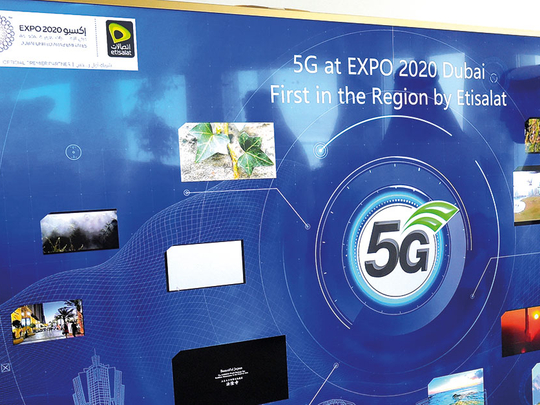
Dubai: Telecom operators in the UAE can capture potential revenues of $3.3 billion (Dh12.11 billion) from the digitalisation of industries with 5G technology, according to a report by Ericsson.
5G mobile technology will connect more machines than people in real-time through the Internet of Things and transform the industrial space. Previous mobile technologies such as 3G and 4G were built for human interaction, but 5G will allow industries to cut cables to their machines with the intelligence of the cloud.
According to the report, the industry growth potential in the UAE is being driven by the digitalisation of the manufacturing sector, contributing to 18 per cent of the potential revenues by 2026, followed by 16 per cent in energy and utilities, and 12.5 per cent in public safety by end of the same period.
Etisalat will launch 5G for wireless and fixed lines for triple play (voice, internet and fixed-line) for consumers this year, but smartphones will be available only next year.
The Abu Dhabi-based operator has installed a base station (antenna) at the Expo 2020 site and will be testing and demonstrating its services and technologies.
Rafiah Ebrahim, head of Ericsson Middle East and Africa, said that digital transformation is taking place in almost every industry, disrupting and creating new business models. 5G is an enabler of this transformation.
Sukhdev Singh, vice-president at market research and analysis services provider Kantar AMRB, said that 5G is as big an innovation as electricity was to mankind.
“It is going to change the world much more than what 3G and 4G did. 4G took us to a level well connected with various people, but what 5G is going to do is to connect people to everything,” he said.
Moreover, he said that 5G will change the way information is happening when you have connected buildings, connected roads, connected cars and smart cities and catapult Dubai into a different stage.
With AI [Artificial Intelligence] also getting into the picture, he added that it is going to be a game-changer.
Turgut Erkul, head of networks evolution and transport solutions at Ericsson, said that 5G is not only about speed, but also latency, efficiency, high reliability and the number of connected devices.
Instead of having separate networks for different sectors such as the police, telcos, public safety and electricity, Erkul said 5G promises to serve all of these industries through one network and without interfering with each other.
“Critical applications such as autonomous vehicles and remote surgery will demand prioritisation. Commercial 5G networks are expected to go live next year with data-heavy applications like augmented reality, virtual reality, 4K and 8K video streaming,” he said.
What is 5G?
5G is the fifth generation of mobile wireless technology and an evolution of the current 4G LTE network. In 5G, data speeds will be 10 to 100 times faster than 4G and can provide up to 10Gbps. The 4G LTE offers a commercial speed of 1Gbps speed (home) and 300Mbps (mobile) in the UAE. Initially, 5G will have a speed of around 1.5Gbps by end of this year and 5Gbps by next year.
While 4G offers a latency of 15-20 milliseconds, 5G’s would be one millisecond and benefit verticals such as autonomous vehicles, healthcare, virtual reality and augmented reality.
Just to give an example, downloading a movie that takes 10 minutes on 4G will take only a few seconds on 5G.
Due to higher bandwidth, more users and devices can be connected at the same time without any degradation.












